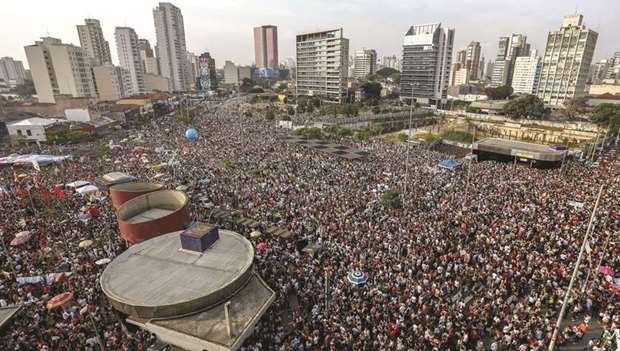The homecoming of Brazil’s far-right presidential frontrunner Jair Bolsonaro from hospital was upstaged this weekend by huge demonstrations as concerns over his authoritarian tendencies grew.
Bolsonaro flew from Sao Paulo to his home in Rio de Janeiro on Saturday, three weeks after being stabbed during campaigning, while tens of thousands of women filled the streets in cities across Brazil to protest against his extremist positions ahead of the October 7 election.
The G1 news site reported anti-Bolsonaro protests in all Brazil’s 27 states grew out of a Facebook group called Women United Against Bolsonaro which nearly 4mn people have joined.
Pro-Bolsonaro demonstrations took place in 16 states, the site said. The piaui magazine website called the demonstrations “historic” and printed a photo of an enormous crowd in Sao Paulo which organisers claimed half a million attended, though police did not provide an estimate.
In Rio the huge crowds that filled the city centre were notable for their diversity – with women of all ages, many of whom had brought children, chanting “not him”, an anti-Bolsonaro hashtag that has become a campaign slogan shared by celebrities like Madonna.
Many demonstrators expressed concerns over Bolsonaro’s declaration in a television interview on Friday that he would not accept any election result he did not win because of his endorsement of the military dictatorship which ran Brazil for two decades.
Flavia Carvalho, 40, a civil servant, carried a “not him” banner designed around an Adolf Hitler cartoon. “He is preaching fascism,” she said. Others said they were protesting against the sexist, racist and homophobic views Bolsonaro has expressed.
“He is sexist. He is misogynist. He is racist,” said Ana Paulo Gonçalves, 24, a teacher. “He wants to go back to the military dictatorship,” said her sister Christine, 29, a designer.
Bolsonaro, a former army captain and veteran lawmaker, currently leads polling for a first-round vote on October 7. Running second is Fernando Haddad, a former mayor of Sao Paulo who took the place of formidably popular former President Luiz Inacio Lula da Silva after Lula’s candidacy was barred because he is serving a prison sentence for graft. Bolsonaro and Haddad are expected to face off in a run-off vote on October 28.
Making adept use of WhatsApp and social media, Bolsonaro has built support across Brazil, attacking Lula’s Workers’ party for its involvement in a huge graft scheme and espousing a hardline approach to law and order. His views have resonated with Brazilians angry and fearful over endemic corruption and rising violent crime. Supporters stage drive-by demonstrations, racing through towns across Brazil in convoys of cars and motorbikes, waving flags and blasting horns.
The divisions Bolsonaro provokes in Brazil were evident in a video of him boarding Saturday’s flight from Sao Paulo. While some passengers regaled him with chants of “myth”, others yelled “fascist” and “not him”.
In a television interview broadcast on Friday, Bolsonaro suggested Brazil’s armed forces could intervene if his main rivals, the leftist Workers’ party, “committed a foul” in the election.
“I don’t accept an election that is not me being elected,” Bolsonaro told reporter Jose Datena, adding that Brazil’s electronic voting system could be defrauded by the Workers’ party, but providing no evidence.
Bolsonaro enjoys widespread support among police and the military. His vice-presidential candidate, Gen Hamilton Mourao, unnerved Brazilians recently when he said in a situation of “anarchy”, a president could declare an “auto-coup”. Both men praise the military dictatorship that ran Brazil from 1964-1985, torturing and executing opponents.
“I lived (during) this phase,” said Maria do Carmo, 84, who was protesting in Rio and saw relatives imprisoned by the military regime. “It was terrible.”
The Folha de S.Paulo newspaper yesterday called on both leading candidates to make a commitment to democracy, accusing Bolsonaro of “stimulating paranoias of manipulation” and criticising the Workers’ party for its attacks on the justice system for Lula’s imprisonment it calls politically motivated.

Demonstrators protest against Brazilian right-wing presidential candidate Jair Bolsonaro at Largo da Batata in Sao Paulo, Brazil.
